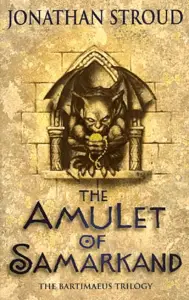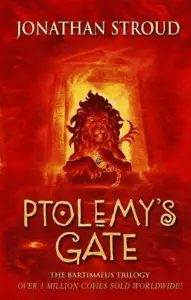Hello again, readers of The Fandomentals. This is the third part of my series about power dynamics in fantasy. It discusses the way the topic is handled in the “Bartimaeus Trilogy” by Jonathan Stroud, consisting of Amulet of Samarkand, Golem’s Eye and Ptolemy’s Gate. There’s a prequel book, Ring of Solomon, but I won’t cover it here. I was highly critical of Legend of Korra’s handling of the problem, and not too happy with the Dragon Age franchise either. In this case, however, I present a work of fiction which comes out swinging in the power dynamics department.

The three books take place in an alternate version of our own world. Where it differs is the magicians. They’re people who can summon spirits from the “Other Place”, an alternate plane of existence. This is the source of all their power. The titular Bartimeus is one of such spirits – an ancient dijinni, who has been summoned by various magicians for five thousand years, having been first bound in ancient Mesopotamia. He narrates most of the story in first person, peppering it with gratuitous amounts of seen-it-all snark and footnotes. The first book begins when a strangely skilled teenage magician, named Nathaniel, summons him.
Nathaniel’s summoning of Bartimaeus, and its weighty consequences, take place in twentieth century England. However, the country looks much different from its real-world equivalent, as it’s ruled by an elite of magicians, whose power is predicated on their enslaved spirits. There’s a sharp class divide between them and the “commoners”, who take care of all the menial tasks of keeping the country running. The British Empire still exists, controlling parts of the Americas and significant territories in Europe. The previous magical power in Europe is said to have been Prague, before it was overthrown by the British. Many historical empires are mentioned as having been built or ruled by magicians – such as Rome.
The books do not shy away from portraying the grim reality of such a societal order. The magicians hold all the power, and they do their best to keep the commoners uninformed, complacent and free of seditious thought. They use bound spirits as surveillance and security, which the commoners can do little against – most of the time, they can’t even see them. In order to see spirits, one needs special glasses or lenses. And obviously, the magicians keep those to themselves.
Education in the British Empire teaches the masses that magicians ruling is the natural order of things. Official education paints the pre-magician government as ineffective. It omits the inconvenient facts that don’t suit this world-view. People who aren’t magicians are supposed to work for those who are – as workers, service providers and soldiers.
One might expect the protagonists of such a story to rebel against such an order. This is not the case in the first book of the series, Amulet of Samarkand. Bartimaeus, the old and cynical genie summoned by Nathaniel, has absolutely no interest in human matters. He only wants to do his job so the magician releases him. Nathaniel, barely in his teens when the story begins, became an apprentice magician as a little boy, and embraces the official ideology of the Empire. He’s ambitious, and secures a place in the government by the end of the first book. At that time, he fully buys into the ideology of magical supremacy. He’s a borderline example of what TVTropes would call “villain protagonist” – he willingly and even enthusiastically participates in upholding an oppressive regime.
In fact, I would consider Nathaniel a deconstruction of the “young prodigy” archetype that is common in fantasy fiction. I can’t say whether it’s intentional or not, but that is how I see it. Nathaniel is, indeed, uncommonly skilled at magic. He also achieves an important government post at the age of fourteen. However, the books show us a darker side of it. The environment in which Nathaniel excels in is deeply toxic – the upper echelons of an autocratic, oppressive regime. More than that, his elevation is a result of his prodigious talent and stopping a scheme against the government. As such, he has no connection and no backing, and the officials around him think he’s an upstart. It’s a very lonely life for a fourteen-year-old.
Nathaniel does eventually manage to listen to the sliver of conscience remaining in him, and realizes the reality of the government he’s serving. But it’s a slow and arduous process for him. Shaking off something you were taught as the natural order of things isn’t easy.
Bartimaeus is a different story. He served different magicians for five millennia, so he knows what the magicians of Britain deny and hide from the commoners – empires ruled by magic inevitably rise up, and just as inevitably fall down. That is because, while normal people have little recourse against attacks made by spirits, heavy use of magic for a long time causes resilience to it to build up among the population. People are born with the ability to shrug off the spirits’ magic and see them without the aid of the tools magicians use to do it. Eventually, enough such people emerge that it allows them to overthrow the magicians. At which point the pendulum swings the other way, and resentful commoners persecute mages. But another magical civilization eventually emerges. Bartimeus treats it as an inevitability, as he has seen is happen many times.
And this is where the trilogy’s commoner point of view comes in. Catherine Jones, known to most as Kitty, is one  such person. She discovers her resilience when a magician has his enslaved spirit unleash a magical attack on her and her friend for accidentally smashing his car. Her friend is crippled for life, but she ends up pretty much unscathed. The magician, of course, escapes any responsibility for the act. She joins a budding resistance movement, made up of a dozen or so individuals with similar resilience.
such person. She discovers her resilience when a magician has his enslaved spirit unleash a magical attack on her and her friend for accidentally smashing his car. Her friend is crippled for life, but she ends up pretty much unscathed. The magician, of course, escapes any responsibility for the act. She joins a budding resistance movement, made up of a dozen or so individuals with similar resilience.
However, she becomes disillusioned with the resistance, which walks to its death after a magician manipulates them into retrieving a powerful magical object. Kitty hears from Bartimaeus about how resilience grows among the people, and how magicians are eventually cast down. Waiting for enough people with resilience to crop up doesn’t satisfy her, however. Especially since Bartimaeus estimates it would take at least fifty years. But there’s another reason she rejects the pattern the world falls into. And that’s the fact that if commoners triumph over magicians, spirits still get only a temporary respite. Which brings us to morality of magic itself.
In Avatar, bending lacks any inherent moral implications, except from those that unavoidably come up when some people have more power than others (and the rare case of bloodbending). Magic in Thedas has more sinister applications than bending does, especially when blood magic comes into play. But at the end of the day, it’s just a powerful, dangerous tool one can use for good or evil. Magic in the Bartimaeus Trilogy, meanwhile, is slavery. Magicians oppress and exploit commoners, but they straight-up enslave spirits. They drag them away from their native plane of existence into a world they find uncomfortable at best, and force them to perform tasks under the pain of severe punishment, including death.
There’s no real getting around that. So while peaceful coexistence between magicians and commoners might be possible, without one side harassing the other, spirits are always going to be slaves. This essentially adds a third dimension to the problem. Magicians of the British Empire rationalize their slave-keeping through rather usual methods. Spirits are vilified, depersonalized and painted as evil. Occasional positive portrayal of spirits keeps the commoners from hating and fearing them too much. Of course, a magician is going to partake in slavery even if they’re not part of an oppressive government.
Bartimaeus does mention some exceptions. Siberian shamans and magicians of the Algonquin people are examples, if brief ones. A much more prominent exception is Ptolemy, a member of the ruling dynasty of Egypt. He was unique, in Bartimaeus words, enough for the cynical dijinni to take his form two thousand years after his death. He and Kitty are the only two characters to really see spirits as people.
Another important difference to be noted here is that magicians are made, not born. Unlike with Avatar and Dragon Age, it’s not an innate trait, but a skill anyone can theoretically learn, although it’s not easy, obviously. This isn’t obvious in the books until Kitty starts dabbling in it for the purpose of summoning Bartimaeus, specifically – which is very deliberate. The magicians of Britain do not want the common people to know that their powers aren’t quite so special. They certainly do not want anyone learning magic without their strict oversight and control; the government pays people to give them young children as apprentices. Then it assigns them to senior magicians. Magicians can’t intermarry, and those that marry commoners can’t have children. All for the purpose of setting them apart from the population.
This makes the relationship between magicians and commoners resemble a class divide much more than in the case of benders in Avatar or mages in Dragon Age. No special trait separates magicians from others. They’re simply a social class that amassed power and kept it from others, which is something we’re all too familiar with.
So that’s how the books present a world of magicians, spirits and commoners. How does the narrative work with them? What about non-magical agency? Legend of Korra woefully lacks it, but Dragon Age by necessity has it; after all, the player can create a non-mage character.
For much of the first book, we see the world through the eyes of a magician and a spirit. As such, we see commoners just like those two see them: in the background. However, cracks already begin to show. As mentioned, Nathaniel never thinks twice about the imperial ideology. But Bartimaeus knows it for the propaganda it is (even if he doesn’t really care). Bartimaeus encounters a few young people who shrug off his magic attacks – one of them, as we later find out, is Kitty. We also see a mercenary working for the instigator of the plot and displaying immense resilience to magic. In other words, we witness a world as fantasy often shows it to us, where non-magical people are in the background. But unlike most fantasy, there are many signals that it’s not quite right.
This is brought to the fore when Kitty Jones enters the picture properly. We follow her life and see England through the eyes of a commoner. We see how they’re resigned to being second-class citizens and having no say in their lives. Some of them look up to magicians, and some of them are resentful. All of them realize there’s little they can do. Aside from the magicians’ obvious power, their propaganda ensures the commoners don’t get seditious thoughts too often. We also see that, like I mentioned, the commoners don’t know most of the things that magicians take for granted. Like, for instance, that their power comes from spirits and isn’t innate.
All of it changes when she discovers her resilience and joins the resistance. Suddenly, they can do something. Unfortunately, the resistance movement is small, and controlled by its founder, who is a petty, secretive and spiteful man. Which really goes to show that power corrupts, no matter who you are, even if it’s just power over a small band of freedom fighters. When the resistance meets its untimely end and she meets Bartimaeus, Kitty develops a desire to break the pattern the world seems unable to escape.
This perspective of a regular person in a world of magic is very valuable. Kitty is all too aware of her vulnerability. She’s resilient to magic, which allows her to go up against magicians and spirits. But she still lacks all the options they have. So she has to be clever and daring to succeed.
Bringing it all together, I think the Bartimaeus Trilogy is fairly unique in a starkly realistic portrayal of a fantasy world. Otherworldly powers elevate those who can use them. And like all people in power, they make sure they stay there. The issue is made worse by the fact that only certain people will become magicians – those who don’t flinch at the moral implications of enslaving spirits.
Of course, as mentioned, only Kitty and Ptolemy see spirits as people. Magicians do their best to depersonalize them, and commoners recognize them mostly as tools of their oppressors. In a way, it seems that the British, magicians or otherwise, are locked into seeing spirits in a particular way. Apprentice magicians and commoners are each fed a different sort of propaganda. It takes a special kind of thinking to break away from such ingrained assumptions. Kitty and Ptolemy had such thinking.
It all results in a fantasy world that feels real. The relations between magicians and non-magicians are what you can imagine would result from such power’s existence. The books explore all the different implications and dimensions of the issue. It’s a very welcome change for someone tired of fantasy skirting around the issue.
All images courtesy of Doubleday publishing company.

